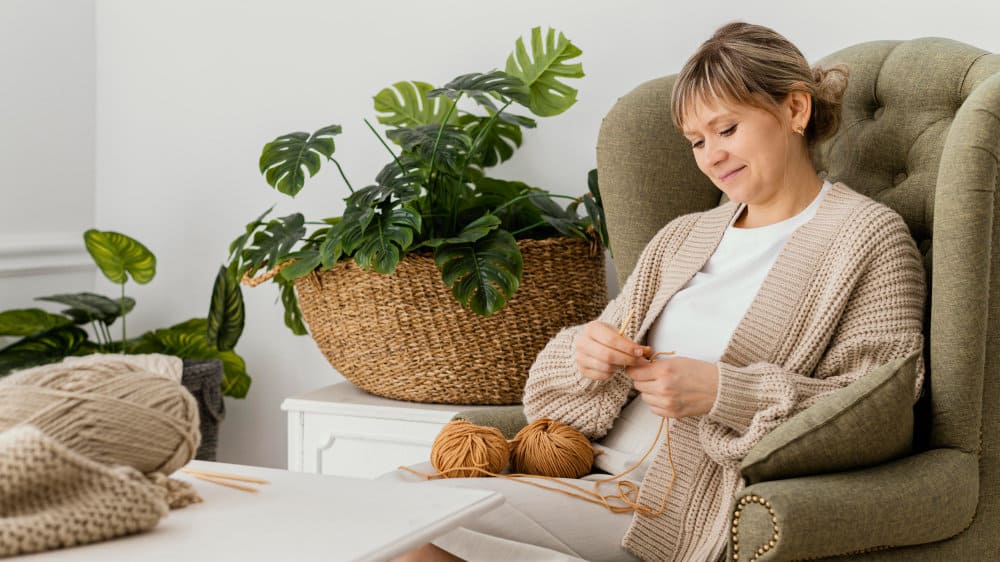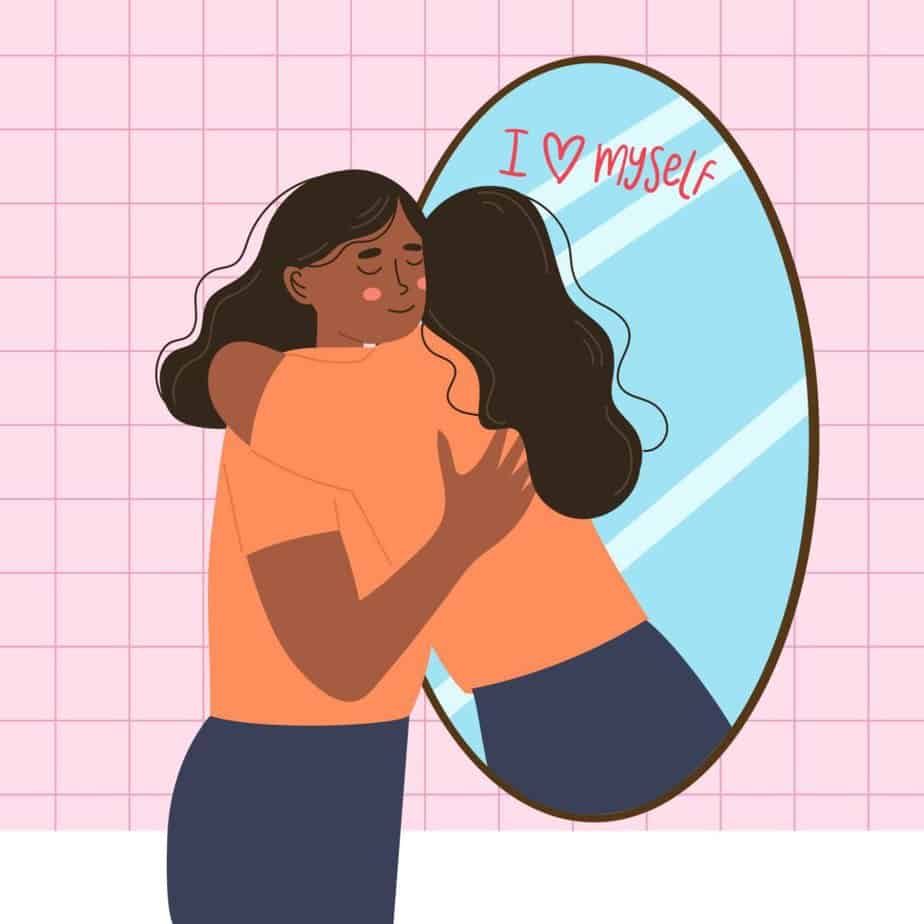Have you spent a lot of time in your life constantly trying to be someone else?
Where you feel the need to chase a certain sense of perfection because you always feel you can be better.
Are you tired of craving people’s approval and acceptance?
Imagine a life where you no longer need to rely on external sources of worth and happiness – a world where you are enough for yourself.
This was me.
All my life, I tried to be perfect.
I wanted to be liked and revered by everyone so I played different roles – it felt like I was an actor in a play.
I adapted to the environment I was in and I was always scared to say the wrong things lest I offend someone with my own thoughts and perspectives.
I found it exhausting.
I spent too much time worrying about what people thought of me and my own thoughts were very negative and scathing.
It was like I was running from myself – my harsh, extremely over-critical self.
When my ex cheated on me and I divorced him, I was more worried about what people would think of me and my failed marriage than I was about the hurt I felt from the relationship.
That’s when I knew I had to change.
Being enough for yourself basically means loving yourself.
It means discovering the power of self-sufficiency and this only comes from self-discovery.
This post contains affiliate links, meaning I may make a commission at no extra cost to you if you decide to click on a link and purchase something. Click here to read the full disclaimer.
What does being enough for yourself mean?
1. It means finding happiness in yourself

Being enough for yourself means finding a deep sense of contentment within your own being.
It means you embrace yourself for what you really are – flaws and all.
Being enough for yourself means not seeking external validation that defines your worth – it means you know that you’re enough.
2. It’s another version of self-love

In a way, I’d say it’s self-love because self-love means prioritizing your mental and physical well-being.
When you’re enough for yourself, you no longer rely on others to fill that void within.
You learn to become more independent and strong. You embrace your uniqueness even during challenging times.
3. It means being kind to yourself

And most of all, being enough for yourself means silencing that horrid inner critic and replacing it with understanding and kindness.
So, let’s say you make a mistake.
Instead of telling yourself, “I knew you’d f**k up. You ruined it. It’s your fault. You should have prepared for this.” you say, “It’s okay, I’ve made this mistake and now I see how I could have done better. I’m going to try again and this time I’ll use this method. I know I can do this.”
Notice how the second tone is more compassionate. It acknowledges the mistake but it tries to provide a solution instead of beating you up.
4. It means setting healthy boundaries
Being enough for yourself can also mean setting boundaries and saying “no” when necessary.
It’s reclaiming your time and energy for the things that truly matter to you.
Why do I feel like I’m not enough?
It could be due to a combination of several factors.
1. We tend to compare our lives to others

In today’s world, where everything is on display, it can be very hard not to go down the rabbit hole of comparison.
Especially with social media like Instagram and TikTok.
I’ve found that I am much happier and have so much more time for my work and my hobbies when I don’t open social media.
It’s difficult to not open Instagram when my friend and partner send me reels – but I strive hard to not give into temptation.
Constant exposure to carefully curated reels does lead to unrealistic standards that we believe are real.
We only see what people are deciding to show us.
This could be the best 5 minutes of their day – but we tend to believe that it’s their whole world and whole life.
2. We seek external validation
From a young age, a lot of us are conditioned to seek approval and validation from others.
People who score higher marks are given more praise and attention. People who excel in sports or art get more fame and recognition.
So we follow suit.
We strive to work hard and excel in things even if it may not make us happy.
We get addicted to this validation.
And when this validation is lacing or is inconsistent – it can lead to self-doubt or a belief that we are not enough on our own.
3. Cultural and societal expectations

The environment that we are raised in can play a HUGE role in shaping our self-perception.
Because I grew up with people who had clear skin, I was always judged for my acne.
I had this pressure to conform to this standard of beauty and it resulted in me being miserable when I couldn’t achieve perfect skin.
This pressure to conform to certain standards of success, beauty or achievement can create a sense of never measuring up.
4. Past trauma or rejection

Because my parents were always busy with work (trying to give me a good future), I found that I only got their attention when I did something bad.
So, I often played pranks on them or created messes in the house just to get scolded – it gave me a certain joy to have their undivided attention.
And I had to rewire my thinking growing up to break this pattern.
Likewise, we all have experienced trauma, rejection, or past failures in our lives.
This can deeply impact our self-esteem.
And it can lead us to question our worth and even believe that we may be flawed.
This is why it is so important to heal.
5. Perfectionism
Striving for perfection (I’m guilty on all counts) is a common trait that leads to feelings of never being good enough.
But here’s the thing though.
As long as we keep pushing ourselves over the limit to hit that goal that we ourselves have created, the goalpost will keep moving away.
It will never be enough unless we learn to accept ourselves for who we really are.
This relentless pursuit of flawlessness sets unrealistic expectations and causes us to criticize ourselves endlessly.
This is why we need to reach a stage of acceptance.
By realizing that almost everyone has some insecurity and that these feelings are normal – we will start becoming more kind to ourselves.
Reaching a place of self-awareness is the first step to becoming enough for ourselves.
This brings me to my next point…
How do I become enough for myself?
1. Understand the importance of self-sufficiency

You’re reading this post for a reason.
You want to be enough for yourself – this means becoming self-sufficient.
Becoming self-sufficient means being content and fulfilled without relying on external validation.
It means knowing you are enough and your self-worth doesn’t depend on external factors.
This means your self-worth and value come from within – not from the opinions or judgments of others.
This means that when I felt like I was less than others due to my acne and unruly curls, I should have realized that I was unique and it’s okay to be different.
It’s okay to not fit in the norm.
Embrace your strengths, weaknesses, and unique qualities.
This is the first step to becoming enough – the first step to self-love.
Now, when you are sufficient, you will have reached the epitome of self-love.
You are not going to rely on others to define your identity or worthiness.
It also means learning a little something about yourself each day and making choices based on your own space and mental capacity.
For instance, if I am feeling low or tired, I won’t take on more than I am capable of because I wouldn’t want to burn out or tire myself.
So, in a way, becoming enough for yourself also means setting healthy boundaries.
You prioritize your needs and desires and communicate them politely and assertively to others.
2. Accept yourself for who you are

When I say accept yourself for who you are, I do not mean that you should not grow or not want to change.
It means accepting the things you are born with and improving the things you genuinely want to improve.
For instance, I want to become smarter each day and so I try to read every opportunity I get. I read something every single day – whether it’s blogs or articles or books.
I do not criticize myself or go down the route of self-blame if I do not know something. I just use it as an opportunity to learn something new.
No matter what your strengths and weaknesses are, analyze yourself first.
Ask yourself things like:
- What matters to me?
- What do I want to do in life?
- Where do I see myself in 5 or 10 years?
- What does life look like for me then?
- What are the little things I can do to slowly reach where I want to be?
When I lost my mom to cancer, I realized how important health was.
I understood that I was in no way healthy and I resolved to fix that.
I’ve been on my journey for several months now and I’m much stronger now than when I started.
But it’s all about taking it one step at a time and being consistent.
Embrace your strengths and flaws without judgment.
Do not at any cost be harsh on yourself. Your mind has the potential to be your worst enemy. So, listen to your thoughts.
Are they overly critical and judgmental?
Or are they kind and compassionate?
Work on making it more compassionate and understanding.
Give yourself that room to grow.
3. Strive to become a better version of yourself

We all have different versions of success, and none of them are wrong.
Some people want to have kids and help make a better future for them.
Some people don’t want to have kids but instead want to do something that involves creativity or travel.
Neither is wrong.
Do not beat yourself up if you have different wants or needs from the people around you.
I never had a childhood that was normal. I didn’t play with other kids my age and I didn’t get a chance to socialize.
So, I realized that I wanted kids for the wrong reasons.
When I reached that realization, I felt like a huge burden lifted. I realized that I just wanted to reclaim my childhood, to feel happy in my sense of being.
And nothing brought me that joy like drawing and writing – so I continue to do that.
I hold support groups to help women talk and break out of their shells, I educate on different platforms and I teach people to draw.
No matter what your dreams and ambitions are, don’t be ashamed of them.
Instead, work toward them.
Figure out all the areas you want to improve and create mini-goals to improve yourself.
For instance, let’s say your goal is to become more fit. Then your mini goals would be:
- Drink 3 liters of water a day
- Do strength training 3 times a week
- Complete 10K steps every single day
- Eat wholesome, nutritious food 80% of the week.
Look up people who give strategies that focus on consistency and are kind. Anything that is worth something takes time to accomplish – so look for people who promise lasting results, not fast results.
4. Embrace mindfulness and gratitude

It’s so easy to go down that route of comparison – don’t.
Nothing good ever comes from it.
Instead of comparing yourself to others, compare yourself to who you were 6 months ago.
This I’ve found really, really works wonders.
No matter what you’re trying to improve, look at your own journey.
I do this with my skin, my art, my writing, my health.
I look at what I was like 6 months ago and see how much I’ve improved or changed.
This helps me realize I’m on the right path and I’m getting better.
This gives me the motivation to move forward.
This journey of becoming enough for yourself involves a lot of self-introspection.
You need to look at your life through an unbiased lens and love yourself for the person you’re becoming.
A couple of ways to become more mindful are:
- Meditation (use Headspace for guided meditation if you are just getting started)
- Reading books on self-love
- Journal so you can document your journey and release your feelings healthily
Everyone has certain things they get lost in – for me, it’s drawing or writing.
So, I encourage you, to do something that makes your heart sing.
What is it that you get lost in? What is that one activity that makes you realize hours have gone by and you haven’t noticed – do more of that.
It can be basketball, dancing, cooking, knitting, talking to people, cleaning, or anything that takes you away from your mind and helps you live in the moment.
5. Engage in self-care

Engaging in self-care is a little more than taking a bubble bath with scented candles around.
It means you need to:
- Identify your needs: Take the time to reflect on your needs and what brings you joy and fulfillment – then do more of those activities.
- Prioritize your self-care: Schedule dedicated time for self-care activities that will help you recharge and relax. It could be skincare or writing in a journal or simply reading before bed.
- Take care of your physical health: This can mean doing anything that helps your body become stronger. This can include exercise, sleeping over 7 hours a day, eating nourishing foods, and drinking a lot of water.
- Taking care of your mental health: This could mean doing activities that stimulate your mind like solving puzzles or learning new skills and jobbies or engaging in intellectual conversations.
- Connecting with other people: We humans are social creatures – spend time with loved ones, and engage in social activities that bring you joy.
- Set boundaries: Learn to say no to people and prioritize your own needs and limits.
6. Surround yourself with people who support and uplift you

It’s quite unfortunate but sometimes the people who we love or who are with us can be the ones who are not letting us grow.
If you have a parent or friends who make you feel like you are not enough, don’t try to change them.
Simply spend more time with people who appreciate you and love and support you.
You cannot change people – their choices and the way they talk and behave are a reflection of their own thoughts and feelings.
You only have control of your life.
Get rid of toxic people and you’ll notice that the quality of your life improves drastically.
7. Celebrate your achievements

No matter how small your achievements are, celebrate them.
Be proud of those achievements.
I’ve been on my fitness journey for a while, but only in the last few months did I make real progress because for the first time, I didn’t chase the results – I built a sustainable lifestyle.
And I celebrate love celebrating those achievements.
It’s so hard for me to practice self-love because I constantly feel like I should be improving and taking notes.
But I’ve found that I need to treat myself like how I treat others.
Show yourself the same kindness and compassion as you would a little child.
Show yourself the love that you’d give to a little kitten or puppy.
Give yourself credit for the progress you make and take pride in your achievements.
This will help you realize your worth and value.
Conclusion
Becoming enough for yourself takes time and patience.
It’s a journey – remember that.
I started this journey when I was 28 and it took me some time to realize that all the peace and love I was chasing was within me the whole time.
I highly recommend therapy if you still feel “stuck” or just want someone to guide you and work with you consistently.
Here are a few more posts you may find useful:
- 9 Powerful Signs Your Higher Self Is Talking to You
- 23 ways to let loose and be yourself
- 19 benefits of being yourself
- 55 ways to comfort yourself without eating
- How to Rebuild your Life After Losing Everything that Matters
- 17 Essential Steps to Start a Brand New Chapter in Your Life
- 13 easy ways to be mentally present every day
- 13 easy ways to plan for success in the future
- How to Go Out Alone with Anxiety (Safely and Comfortably)
- 11 Warm and Comforting Books to Read During Difficult Times
- 13 genuine ways to make every day count
- 35 honest ways to get your life together
- 7 easy ways to deal with impatient people
- Struggling with singleness? What I did to combat this










